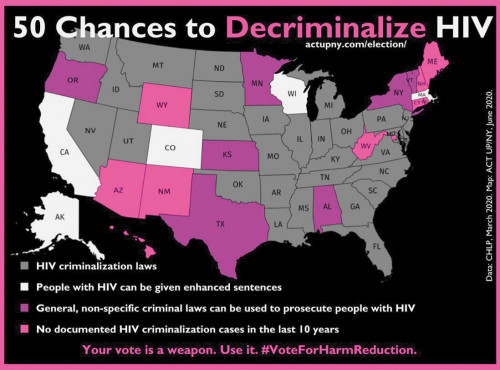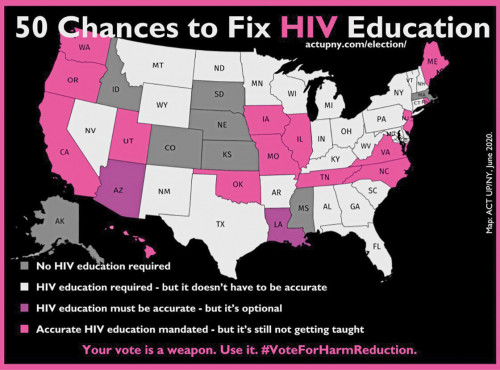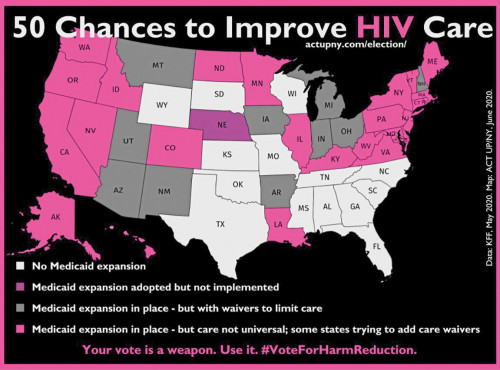In 1985, six gay men who were living in New York City (Avram Finkelstein, Brian Howard, Oliver Johnston, Charles Kreloff, Chris Lione and Jorge Socarrás) formed a consciousness-raising collective to support one another during the early days of the AIDS crisis. To express their outrage at the government’s inaction on the issue of HIV, they decided to create a series of political posters. Their first, and now-iconic, poster featured the phrase “Silence = Death” printed in white below a pink triangle against a black background. In early 1987, the collective plastered the poster throughout the city in areas where it would be seen by members of the LGBT community as well as the media. Not long afterward, the activist group AIDS Coalition to Unleash Power (ACT UP) formed, and the collective’s poster became ACT UP’s unofficial logo. The collective became known as the Silence = Death Project and produced two more political posters before disbanding to work on other projects.
The final poster in the series, the Silence = Death Vote poster, which appears on this issue’s cover, was created to boost voting in the 1988 election, when the AIDS epidemic was at its peak. The poster challenged activists to educate themselves about candidates’ positions on HIV-related issues and to cast their votes accordingly.
Today, with the 2020 election nearly upon us, we find ourselves in the midst of a new pandemic. Our scientists and public health experts are under attack. Fear and ignorance regarding the new coronavirus threaten everyone’s health.
But for HIV advocates, such threats to public health are not new. We understand the importance of having access to health care and support when combating a life-threatening illness. We understand the importance of providing factual and unbiased information about how to prevent and treat a virus. We understand that it’s wrong to discriminate against anyone because they have a virus—because a virus does not discriminate. People living with HIV know what it’s like to live with a virus, and HIV advocates know what it takes to fight one.
For the 2020 election, HIV advocates are being challenged to leverage their votes to support candidates whose policies align with strategies for ending the U.S. epidemic. Many of the HIV policies in the United States are determined at the state and local levels, and the next election could have a significant impact on how HIV and other resources are distributed in your area.
To elevate campaign conversations about HIV-related issues, ACT UP New York created a continuing virtual action on ACTUPNY.com that includes information on where each state stands on HIV education, HIV criminalization and Medicaid expansion. On the following pages, POZ has adapted the group’s virtual demonstration to help you determine your state’s stance on the issues and let you know how to contact your candidates to demand action and change.
Are you up to the challenge? Remember to act up, fight back and, most importantly, vote.
HIV CRIMINALIZATION
Most HIV criminalization laws were passed in the early days of the epidemic and do not reflect advances in modern HIV treatment and prevention. Some of these laws criminalize behavior that doesn’t even transmit HIV, and some criminalize behavior regardless of whether or not HIV is transmitted. These types of laws can discourage HIV testing because they punish those who know their status. Additionally, several states permit sentence enhancements if certain crimes are committed by someone living with HIV, and these often result in longer sentences for people of color. Here are some questions for your state and local candidates about issues regarding HIV criminalization.

Courtesy of Act Up New York
If you live in a state that criminalizes HIV (gray or white on the map), you can ask:
- HIV criminalization laws are outdated and unjust. People living with HIV who are on effective treatment and maintain an undetectable viral load cannot transmit HIV sexually. Will you support modern medicine by pushing to repeal HIV criminalization and enhanced sentencing laws?
- Black Americans account for over 40% of people with HIV in the United States, so laws that punish people for getting and transmitting HIV can disproportionately affect the Black community more than others. These laws also discourage people from getting tested for HIV. Will you help end the HIV epidemic in the Black community by repealing HIV criminalization and enhanced sentencing laws?
If you live in a state that does not specifically criminalize HIV (pink or purple on the map), you can ask:
- The Occupational Safety and Health Administration (OSHA) ensures safe and healthful working conditions by setting and enforcing standards and by providing training, outreach, education and assistance. Yet some employers still incorrectly believe people can get HIV from spit, laundry or casual contact. Will you advocate for a review of OSHA’s statutes, standards and regulations to ensure that they accurately reflect how HIV is transmitted?
- Some state public employees, including teachers and police, incorrectly believe HIV can be transmitted by spit and toilet seats, for example. Authority figures in our communities who maintain outdated beliefs can harm people living with HIV as well as people at risk for HIV. Will you advocate for mandatory HIV sensitivity training for all public employees?
HIV EDUCATION
Fortunately, even without a cure or a vaccine, we have the tools to end the HIV epidemic. We know how to prevent HIV. Practicing safer sex and not sharing equipment to inject drugs can prevent HIV transmission. U=U (Undetectable Equals Untransmittable) is shorthand for the fact that when people living with HIV are on effective treatment, they cannot transmit the virus sexually. Pre-exposure prophylaxis (PrEP) is an HIV prevention tool that enables an HIV-negative person to take antiretroviral medication to greatly reduce their risk of contracting HIV.
Unfortunately, some states have chosen not to teach this information in their schools. While other states may require that HIV is taught, they don’t require the information to be accurate or up to date. It will be difficult to end the epidemic if we don’t teach future generations how to prevent it. Here are some questions for your state and local candidates about issues regarding HIV education.

Courtesy of Act Up New York
If you live in a state that does not mandate medically accurate HIV education (any color but pink on the map), you can ask:
- According to the Centers for Disease Control and Prevention (CDC), today’s antiretroviral (ARV) medication makes HIV nearly 100% preventable and treatable when taken as prescribed. Will you support legislation that mandates medically accurate HIV education—including information about U=U and PrEP—in accordance with CDC recommendations?
- Currently, some students in the state learn about HIV, while others do not. Students who don’t learn about HIV at school are more likely to be at risk for the virus. Will you advocate for measures that ensure HIV education is being taught consistently across all public schools?
If you live in a state that already mandates medically accurate HIV education (pink states on the map), you can ask:
- Without meaningful compliance measures, many local schools can hide their noncompliance with the state mandate to provide medically accurate HIV education. Teachers have anonymously reported feeling pressured to check off a box stating that they’ve taught about HIV, even when they haven’t. Will you advocate for meaningful compliance measures that ensure HIV education is being taught consistently across all public schools?
- According to the CDC, today’s ARV medication makes the virus nearly 100% preventable and treatable when taken as prescribed, but many school districts are still teaching outdated info. Will you support legislation that requires regularly updating curricula to reflect current medical information—including information about U=U and PrEP—in accordance with CDC recommendations?
MEDICAID EXPANSION
Medicaid is a critical source of health care coverage for many people living with HIV. People with a low income and who are part of a “categorically eligible” group (children, parents with dependent children, pregnant women and people with disabilities) can qualify for Medicaid. Each state establishes and administers its own Medicaid program, but they are all required to cover certain mandatory benefits. In 2010, the Affordable Care Act provided states with the option of expanding Medicaid eligibility to include people below certain income levels, which enabled greater access to HIV care and treatment. Here are some questions for your state and local candidates about issues regarding Medicaid expansion.

Courtesy of Act Up New York
If you live in a state that has not expanded Medicaid (white on the map), you can ask:
- Treatment for HIV and other chronic illnesses is extremely costly for people without affordable insurance. The Affordable Care Act enabled thousands of Americans who had been denied affordable health care because of a preexisting condition, like HIV, to get health insurance. By expanding Medicaid, even more Americans will be able to access the medications they need to survive. Will you advocate to expand Medicaid to include those with an income at or below 138% of the federal poverty level?
If you live in a state that has expanded Medicaid (any other color on the map), you can ask:
- Some states are using Section 1115 waivers to implement Medicaid expansion. While some of these waivers may be helpful, cost-effective ways to expand the program, others are being used to limit access to care. These types of waivers include those that base eligibility on work and work-related activities or drug screening and testing, those that limit the length of time people can remain covered and those that include “healthy behavior” provisions. Will you oppose creating or renewing Section 1115 waivers that are used to limit access to care?
Adapted with permission from ACT UP New York (actupny.com/election/)







1 Comment
1 Comment